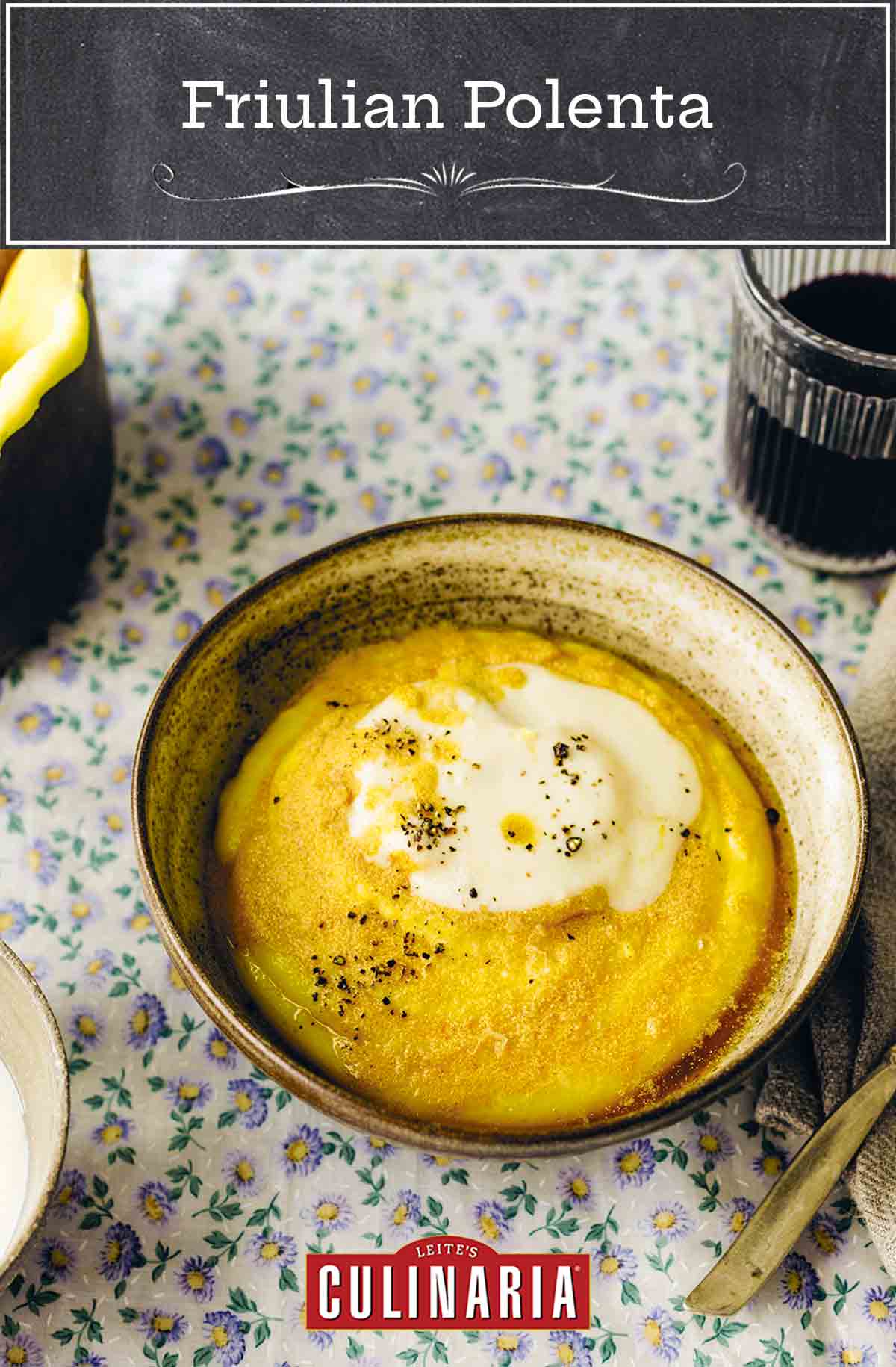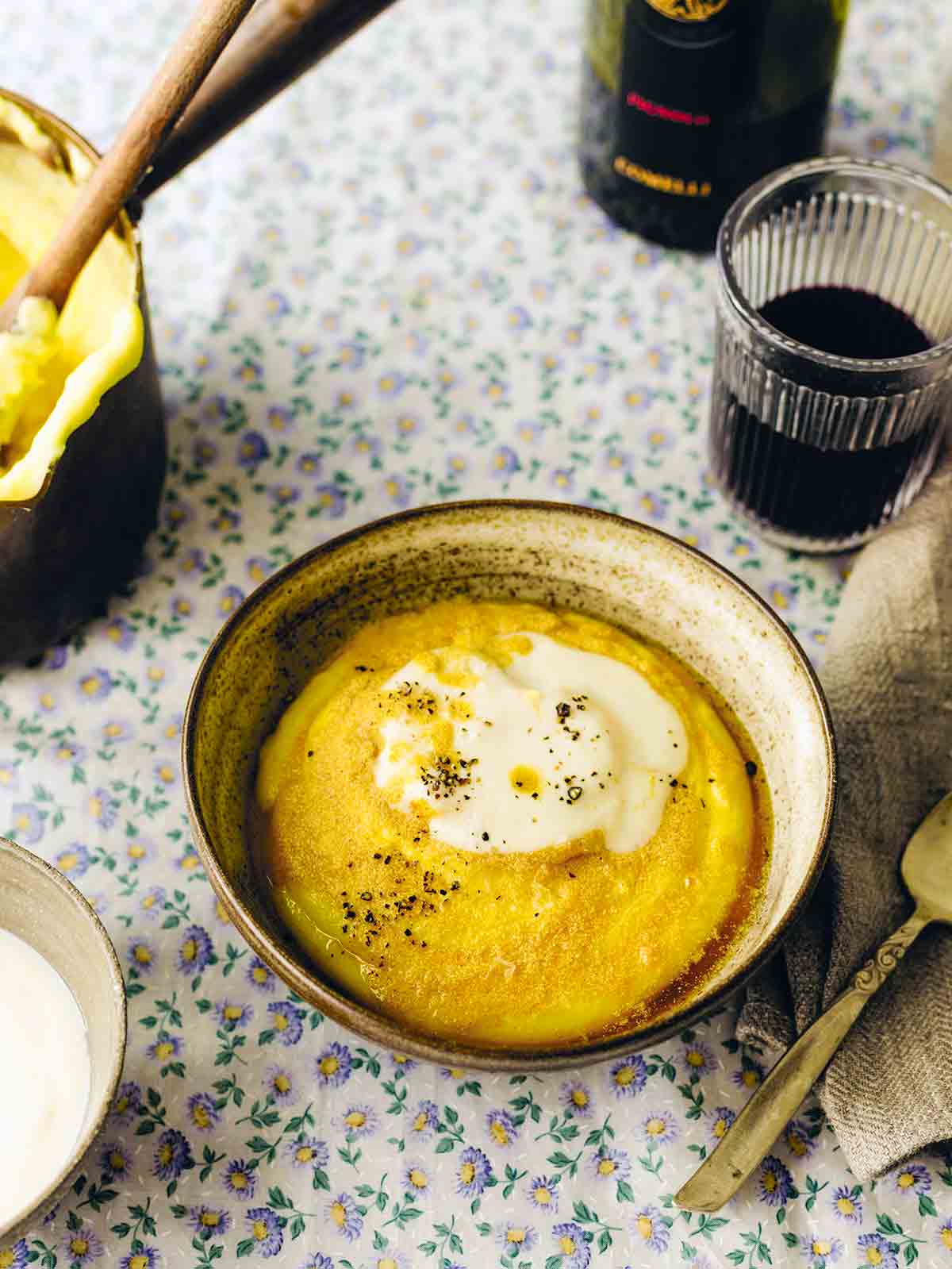
Polenta can take many forms, and this version has a pool of cheese on top. The cheeses Cosetti calls for are formaggio di malga (a pliable hard cheese that’s quite strong and salty), caprino (a fresh goat’s-milk cheese), and ricotta fresca (fresh ricotta). While the ricotta may be easy to source, I suggest easier-to-access Gruyere in place of formaggio di malga, and any fresh goat’s-milk cheese as a substitute for caprino.—Katie Quinn
Friulian Polenta FAQs
To reheat your polenta to a creamy consistency, microwave or heat on the stove over low heat, stirring in a bit of water or milk as needed.
Polenta is made from a coarsely ground variety of corn that’s ideal for creating the creamy porridge we know and love. Cornmeal refers to ground corn and can come in a variety of textures ranging from very fine to coarse. While any medium or coarsely ground cornmeal will work for making polenta, it’s worth the effort to seek out products specifically labeled as ‘polenta’.
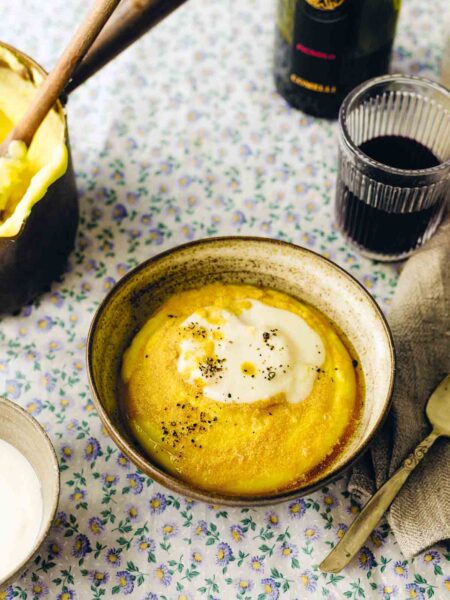
Friulian Polenta
Ingredients
For the polenta
- 4 1/4 cups water (or whey)
- 2 cups whole milk
- 1 teaspoon fine sea salt, plus more as needed
- 1 1/3 cups polenta
For the sauce
- 11 ounces cheese (a combination of Gruyère, fresh ricotta, and goat cheese), shredded or broken into smaller pieces
- 1/2 cup whole milk
For topping
- 4 tablespoons (2 oz) salted butter
- 1/3 cup finely ground cornmeal
- Fine sea salt and freshly ground black pepper (optional)
Instructions
Make the polenta
- In a large saucepan over medium heat, combine the water and milk and bring to a simmer. Add the salt, then gradually pour in the polenta, stirring vigorously with a wire whisk or wooden spoon to avoid clumping.
- Reduce the heat to medium-low and cook, stirring fairly continuously, until the polenta is thick and almost creamy in texture and begins to pull away from the sides of the pan, 30 to 50 minutes (or according to package directions). Try a bite; if the individual grains still feel firm, add a little more water and whisk it in well. As it cooks, make sure you’re scraping the bottom, corners, and sides of the pan so the polenta doesn’t catch and burn.
Make the sauce
- Fill a medium saucepan with 1 inch (2.5 cm) of water and bring it to a boil over medium heat, then reduce the heat to maintain a simmer.
- Place the cheeses and milk in a medium heatproof bowl and set it over the pan of water. Let the cheeses melt together, stirring every so often to combine them with the milk, until you have a smooth liquid, 10 to 20 minutes. If the sauce is ready before the polenta, set it to the side until the polenta is almost done, at which point you can reheat the sauce on the stovetop, while whisking, to ready it for serving.
☞ TESTER TIP: If your cheese sauce is too thick, whisk in additional milk, 1 tablespoon at a time until you get a smooth sauce.
Make the topping
- In a small saucepan over medium heat, combine the butter and finely ground cornmeal and cook, stirring until the butter melts. Continue to cook, stirring occasionally, until toasted and golden, 4 to 5 minutes. Remove from the heat.
- When the polenta has finished cooking, taste and season with salt as needed, then remove from the heat.
- Divvy it among individual bowls and pour the sauce over the top, followed by a spoonful of the topping. Season with more salt and pepper, if desired, and serve immediately.
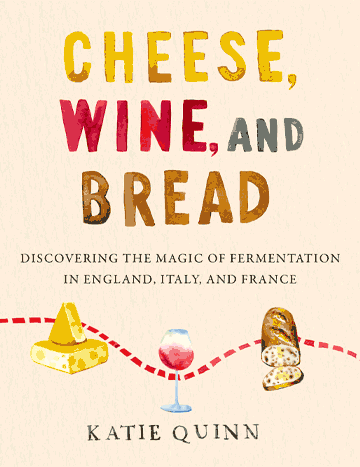
Explore More with AI
Nutrition
Nutrition information is automatically calculated, so should only be used as an approximation.
Recipe Testers’ Reviews
Did you know only 68% of the recipes we test make it onto the site? This recipe survived our rigorous blind testing process by multiple home cooks. It earned the Leite’s Culinaria stamp of approval—and the testers’ reviews below prove it.
I’ve always loved polenta, and this Friulian polenta recipe truly takes it to the next level with additions you won’t be able to live without after you try it. The cheesy sauce is so easy to whip together and adds the perfect creamy indulgence; and the buttery crunchy cornmeal topping is a real underdog, contributing a contrasting texture and earthiness you didn’t know you needed.
This dish is enough of a star to be the center of your meal but it will happily dazzle as a side dish. I served my polenta with simple roasted vegetables and it made a perfect and easy vegetarian dinner, but it would also be delicious with sausages or braised meats. It’s all creamy, comforting, and delicious. A perfect winter meal with some sophisticated flair.
When I crave comfort food, it’s mostly never polenta. However, when I read this Friulian polenta recipe, I had an immediate urge to line up some bowls and spoons for the grand finale.
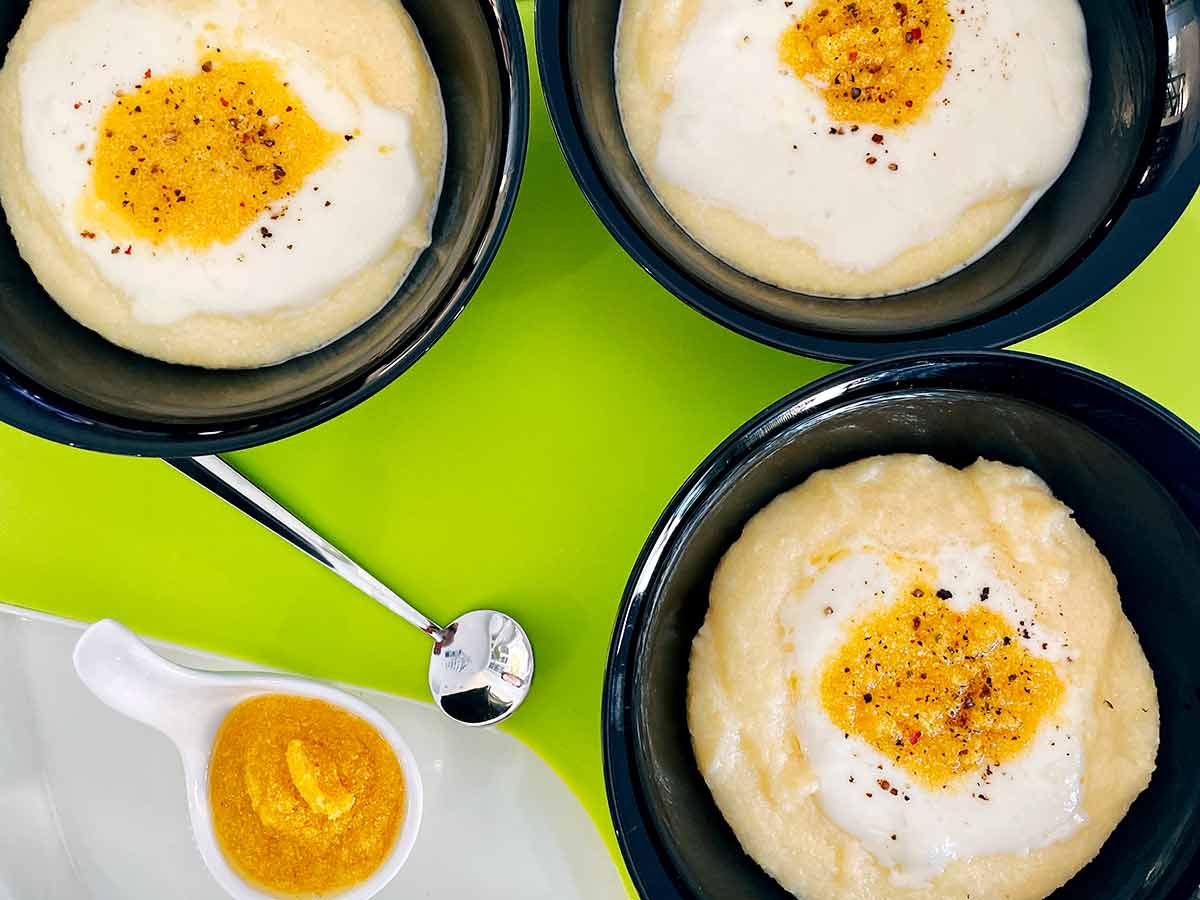
I used a nonstick pan to cook my polenta. Between the salty cheese and the lightly salted whey, the final product was perfectly seasoned requiring only a couple of twists of the pepper grinder. The ratio of cheese sauce to polenta was adequate. The “morchia” was in fact a delightful sludge with the butter removing the cornmeal raw taste but not the crispy and grainy consistency. The final layers of smooth polenta, creamy cheese sauce with a kick, and crunchy bits really made for a warm, comforting, and fun to eat dish.
I served the freshly made warm cheesy polenta in a small bowl as breakfast mimicking an egg-topped polenta bowl. The rest was later served with a mushroom ragu and as a side for pulled pork. The leftovers were stored layered then warmed in the microwave. There was slight separation of the sauce and polenta during microwaving that was remedied by stirring.
This recipe makes a creamy fluffy polenta independent of the cheese sauce or crunchy topping making it more versatile as a base for other toppings.
The increased liquid in this recipe (our bag of Bob’s Red Mill set a ratio of 3 cups water to 1 cup polenta), possibly using milk and water, and the longer time to get to lava-like burps did result in a much, much fluffier polenta, and that texture is worth every minute of whisking over a hot pan. The cheese sauce was very good at first, and then soured noticeably after cooling, though that may have been the cheeses I used (4 oz whole milk ricotta, 4 oz goat and 3 oz Gruyère).
The topping was found to be unsettling to some of us, one person likening it to sand in their salad, though it took me ten minutes to achieve the described golden toasted crumbs and they may have been over toasted. I planned to make this on an evening in which I could battle the three pans without distraction—leftover tenderloin and a célerie rémoulade (Patricia Wells) prepared ahead were served alongside.
